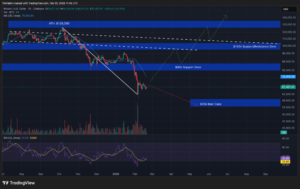Last updated:
 Why Trust Cryptonews
Why Trust Cryptonews

A Texas federal judge on Monday dismissed a securities class action lawsuit against Bancor protocol operators. The judge agreed with a magistrate judge’s findings, stating that the plaintiffs failed to prove US courts had jurisdiction over the foreign defendants.
Judge Robert Pitman ruled that Bancor’s foreign operations are not covered under US securities laws, in line with the magistrate’s recommendation. He based the decision on the plaintiffs’ failure to show that the crypto transactions took place in the US or fell under US jurisdiction.
This means the plaintiffs cannot sue Bancor in the US over its alleged suspension of an investment protection feature.
Bancor, Founders Not Subject to US Jurisdiction, Judge Says
The magistrate judge stated that Bancor, its founders, and related entities in Israel or Switzerland lack sufficient ties to the US. The court, therefore, has no jurisdiction over them.
Further, he noted that US securities laws don’t apply due to extraterritoriality issues. He suggested that plaintiffs could pursue their complaints in Israeli courts, as defendants are based there.
Bancor Hit with Lawsuit After Halting Promised Loss Protection for Investors
In their complaint, the plaintiffs claimed Bancor promoted a feature called impermanent loss protection to shield their investments from losses. This feature supposedly aimed to attract liquidity providers to the protocol, leading to over $2.3b in crypto investments.
They asked the court to cancel their contracts. Also, they argued that Bancor’s failure to follow regulations made the contracts invalid. They also accused Bancor of violating Texas laws. The claims included fraud, breaking promises, mismanaging funds, and unfairly profiting at the investors’ expense.
The lawsuit alleged violations of the Securities Act of 1933 and the Exchange Act of 1934, along with claims of contract breach and unjust enrichment.
In 2022, after withdrawals triggered payment obligations to liquidity providers, Bancor stopped the impermanent loss protection. As a result, providers faced “the very losses that Defendants had promised to ‘100% protect’ against,” the lawsuit claimed.

















